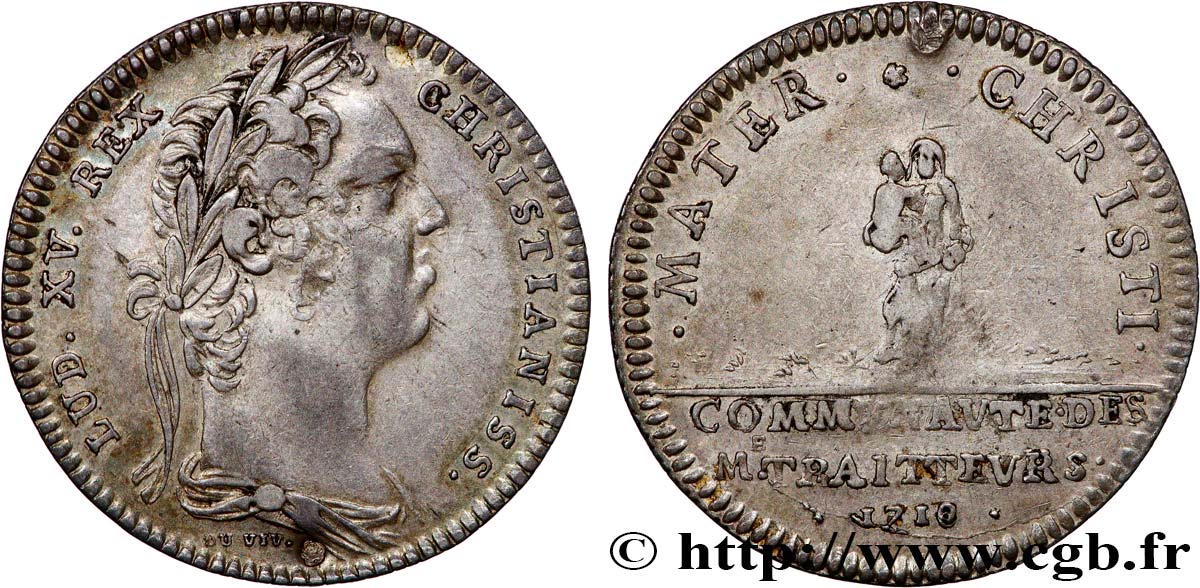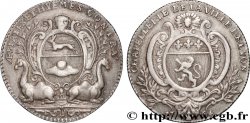fjt_699448 - CORPORATIONS Traiteurs 1719
75.00 €(Approx. 87.75$ | 65.25£)
Quantity
Add to your cart

Type : Traiteurs
Date: 1719
Metal : silver
Diameter : 27,5 mm
Weight : 4,77 g.
Rarity : R1
Coments on the condition:
poinçon au droit à 5 heures, visible également au revers
Catalogue references :
Obverse
Obverse legend : LUD. XV. REX CHRISTIANISS.
Obverse description : Buste à droite de Louis XV signé DUVIV. [n° 308a].
Obverse translation : Louis XV, roi très chrétien.
Reverse
Reverse legend : MATER. CHRISTI ; À L'EXERGUE : COMMUNAUTE. DES. ME. TRAITEURS. 1719 (9 À L'ENVERS).
Reverse description : La Vierge debout de face, tenant dans ses bras l'enfant Jésus.
Reverse translation : La mère du Christ.
Commentary
Sous l'Ancien régime, le traiteur exerce une profession plus respectable que celle de tavernier, qui ne vendait que du vin, de celle du rôtisseur ou celle de cabaretier qui servait vin et repas complets, ce dernier parvenant toutefois à attirer toutes les couches de société. Les marchands de vin traiteurs, spécialisés à l'origine dans les noces et les banquets, supplantent au XVIIIe siècle tavernier, rôtisseur et cabaretier lorsqu'ils se mettent aussi à préparer les repas pour des clients fidèles ou de passage, avant d'être à leur tour supplantés par les restaurateurs à la fin du XVIIIe. Voir la fiche http://fr.wikipedia.org/wiki/Traiteur.
Under the Ancien Régime, the caterer exercised a more respectable profession than that of the tavern keeper, who only sold wine, that of the roaster or that of the cabaret keeper who served wine and complete meals, the latter nevertheless managing to attract all levels of society. Wine merchant caterers, originally specialized in weddings and banquets, supplanted the tavern keeper, roaster and cabaret keeper in the 18th century when they also began to prepare meals for loyal or passing customers, before being in turn supplanted by restaurateurs at the end of the 18th century. See the file http://fr.wikipedia.org/wiki/Traiteur
Under the Ancien Régime, the caterer exercised a more respectable profession than that of the tavern keeper, who only sold wine, that of the roaster or that of the cabaret keeper who served wine and complete meals, the latter nevertheless managing to attract all levels of society. Wine merchant caterers, originally specialized in weddings and banquets, supplanted the tavern keeper, roaster and cabaret keeper in the 18th century when they also began to prepare meals for loyal or passing customers, before being in turn supplanted by restaurateurs at the end of the 18th century. See the file http://fr.wikipedia.org/wiki/Traiteur








 Report a mistake
Report a mistake Print the page
Print the page Share my selection
Share my selection Ask a question
Ask a question Consign / sell
Consign / sell
 Full data
Full data















